Cable Center Hall of Fame 2018 Inductees
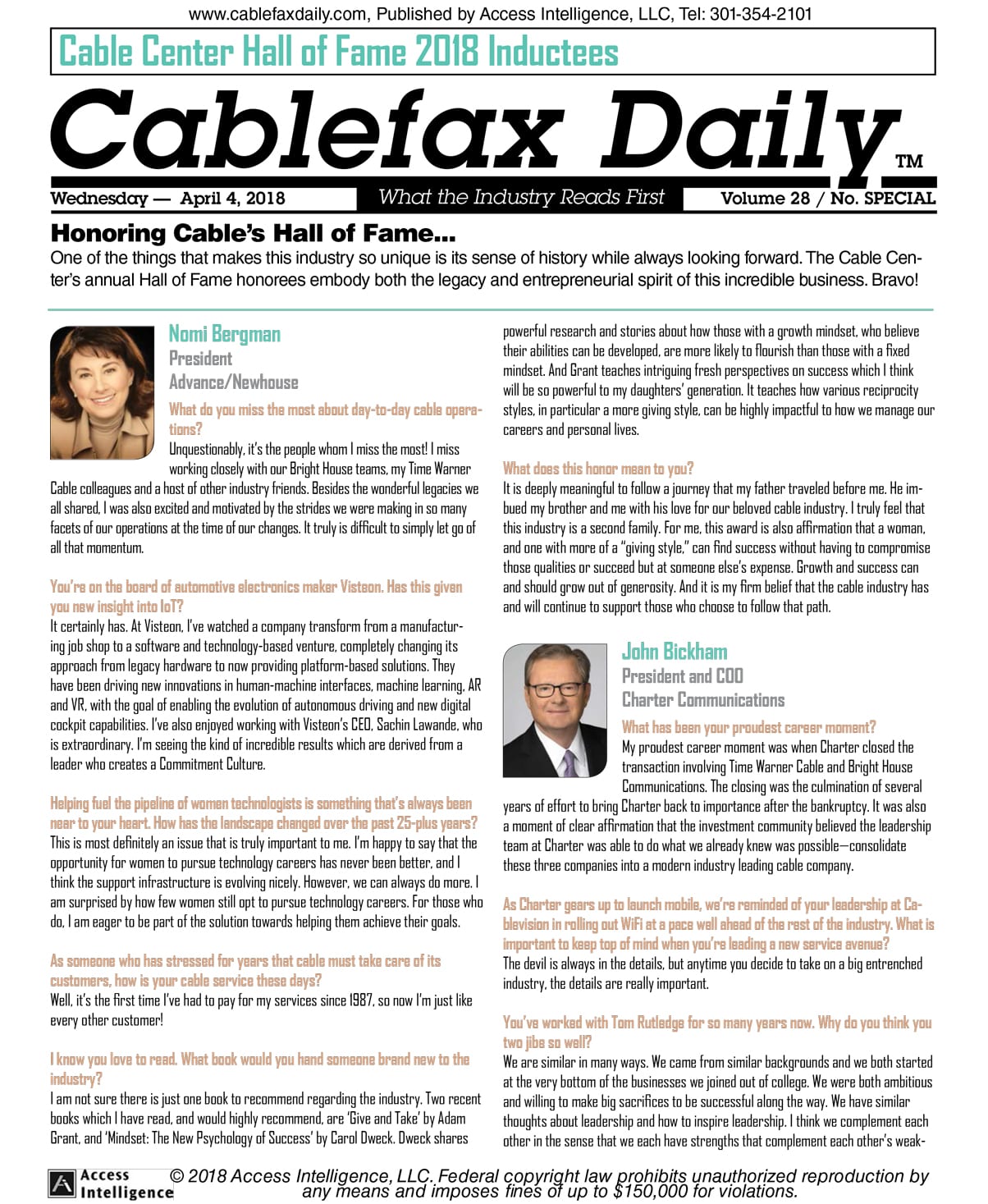
Honoring Cable’s Hall of Fame…
One of the things that makes this industry so unique is its sense of history while always looking forward. The Cable Center’s annual Hall of Fame honorees embody both the legacy and entrepreneurial spirit of this incredible business. Bravo!
 Nomi Bergman
Nomi Bergman
President | Advance/Newhouse
What do you miss the most about day-to-day cable operations?
Unquestionably, it’s the people whom I miss the most! I miss working closely with our Bright House teams, my Time Warner Cable colleagues and a host of other industry friends. Besides the wonderful legacies we all shared, I was also excited and motivated by the strides we were making in so many facets of our operations at the time of our changes. It truly is difficult to simply let go of all that momentum.
You’re on the board of automotive electronics maker Visteon. Has this given you new insight into IoT?
It certainly has. At Visteon, I’ve watched a company transform from a manufacturing job shop to a software and technology-based venture, completely changing its approach from legacy hardware to now providing platform-based solutions. They have been driving new innovations in human-machine interfaces, machine learning, AR and VR, with the goal of enabling the evolution of autonomous driving and new digital cockpit capabilities. I’ve also enjoyed working with Visteon’s CEO, Sachin Lawande, who is extraordinary. I’m seeing the kind of incredible results which are derived from a leader who creates a Commitment Culture.
Helping fuel the pipeline of women technologists is something that’s always been near to your heart. How has the landscape changed over the past 25-plus years?
This is most definitely an issue that is truly important to me. I’m happy to say that the opportunity for women to pursue technology careers has never been better, and I think the support infrastructure is evolving nicely. However, we can always do more. I am surprised by how few women still opt to pursue technology careers. For those who do, I am eager to be part of the solution towards helping them achieve their goals.
As someone who has stressed for years that cable must take care of its customers, how is your cable service these days?
Well, it’s the first time I’ve had to pay for my services since 1987, so now I’m just like every other customer!
I know you love to read. What book would you hand someone brand new to the industry?
I am not sure there is just one book to recommend regarding the industry. Two recent books which I have read, and would highly recommend, are ‘Give and Take’ by Adam Grant, and ‘Mindset: The New Psychology of Success’ by Carol Dweck. Dweck shares powerful research and stories about how those with a growth mindset, who believe their abilities can be developed, are more likely to flourish than those with a fixed mindset. And Grant teaches intriguing fresh perspectives on success which I think will be so powerful to my daughters’ generation. It teaches how various reciprocity styles, in particular a more giving style, can be highly impactful to how we manage our careers and personal lives.
What does this honor mean to you?
It is deeply meaningful to follow a journey that my father traveled before me. He imbued my brother and me with his love for our beloved cable industry. I truly feel that this industry is a second family. For me, this award is also affirmation that a woman, and one with more of a “giving style,” can find success without having to compromise those qualities or succeed but at someone else’s expense. Growth and success can and should grow out of generosity. And it is my firm belief that the cable industry has and will continue to support those who choose to follow that path.
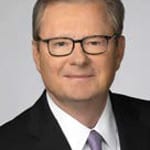 John Bickham
John Bickham
President and COO | Charter Communications
What has been your proudest career moment?
My proudest career moment was when Charter closed the transaction involving Time Warner Cable and Bright House Communications. The closing was the culmination of several years of effort to bring Charter back to importance after the bankruptcy. It was also a moment of clear affirmation that the investment community believed the leadership team at Charter was able to do what we already knew was possible—consolidate these three companies into a modern industry leading cable company.
As Charter gears up to launch mobile, we’re reminded of your leadership at Cablevision in rolling out WiFi at a pace well ahead of the rest of the industry. What is important to keep top of mind when you’re leading a new service avenue?
The devil is always in the details, but anytime you decide to take on a big entrenched industry, the details are really important.
You’ve worked with Tom Rutledge for so many years now. Why do you think you two jibe so well?
We are similar in many ways. We came from similar backgrounds and we both started at the very bottom of the businesses we joined out of college. We were both ambitious and willing to make big sacrifices to be successful along the way. We have similar thoughts about leadership and how to inspire leadership. I think we complement each other in the sense that we each have strengths that complement each other’s weaknesses. Finally, we developed a deep respect for each other over the years.
How does 5G change the landscape?
I’m not sure it does change the landscape. One thing for sure is that 5G plays to the strengths of the cable industry and its ubiquitous high capacity networks necessary to stitch together the 5G small cell architecture.
What’s your prediction when it comes to industry consolidation?
There has been a slow steady consolidation and it will continue until there are no more than two traditional cable companies in the US.
How does going into the Cable Hall of Fame make you feel?
The Hall of Fame is full of men and women who made this industry what it is today and I feel fortunate to join them and be recognized for my time. It also proves one of my beliefs, if you hang around long enough it is possible for good things to happen.
 ‘Breaking Bad,’ Television drama series
‘Breaking Bad,’ Television drama series
Vince Gilligan, creator | AMC
As an artist, do you see a big difference between broadcasting and cable these days?
As much as I love cable, cable is Fred Astaire and broadcast is Ginger Rogers—doing everything he was doing but backwards and in high heels. I think there’s great talent and artistry on both sides. With the broadcast model being what it is, where there’s 22 or 24 episodes a season, it’s amazing such good work is done consistently in broadcast. Having said that, I love the cable model. I would never go back to broadcast. Being responsible for that many episodes in a season is crushing. The first season I was ever involved with “The X-Files” on, Season 2—I was just a writer then; I was not a showrunner—we were responsible for 26 episodes of television. What makes cable so wonderful for people like myself is that it’s figured out a model that works financially speaking in which you do 8, 10, 13 episodes a year. From a writer’s perspective, it allows for higher quality.
Given “Breaking Bad’s” dark nature, was it a tough sell?
Sony signed on immediately. Then we got no after no from networks. I had given up on Breaking Bad. And then, thank God, like a white knight on a horse AMC came along. Every step of the way they believed in me and the show. It continues to be a wonderful experience working with them on the spinoff series “Better Call Saul.”
We seem drawn to darkly comic material and heavily flawed characters. What do you find interesting about those kinds of stories?
With Breaking Bad, I was trying to create a television show where a character changes throughout the series. I came to realize TV was populated by and large by characters who didn’t change. And then in terms of having an anti-hero… if it weren’t for “The Sopranos” or “The Shield,” I don’t know that I would have gotten the opportunity to tell that kind of a story. At the time Breaking Bad went on the air, it was still a relative novelty. The dark humor aspect always seemed a good fit for me because if I’m telling a story of a guy dying from cancer and cooking crystal meth, I damn well better ensure that’s there as much humor in it as possible to leaven the seriousness of it.
Beyond the world of Breaking Bad and Better Call Saul, are there other storytelling genres or concepts that you’d really like to try?
I don’t really think in terms of genres. I’d love to figure out a way to do a good Western. I love science fiction. These different genres are of interest to me, but I don’t really approach a new project from that way. I usually come at it from a main character that interests me. [Genre] is almost an afterthought.
What does “Breaking Bad” being inducted into the Cable Hall of Fame alongside last year’s honoree “The Sopranos” mean to you?
It means the world to me. I didn’t see it coming. On some level to be placed in a similar league as The Sopranos, it just blows my mind. Being in that same company is so flattering. People always ask me did you think Breaking Bad was going to be such a success. No! I thought it was going to be an abject failure… who knew? It’s such a good feeling.
 Balan Nair
Balan Nair
President & CEO | Liberty Latin America
You’ve been part of the Liberty family for more than 10 years. How would you sum up its core values?
A key focus of the Liberty families is on creating value for its shareholders and its employees. And, to do it in a way that is transparent, creative and thoughtful.
You came on board as head of Liberty Latin America after Puerto Rico’s devastating hurricane hit and back-to-back hurricanes in the Caribbean. How do you step up and lead at a time when it’s not business as usual?
My primary role as a leader is to support and create an environment that brings out the best in my team. In essence, it is to make my colleagues successful. And I am so proud of my Caribbean colleagues in how they are rebuilding our business and their communities. We will get through this challenge in Puerto Rico and are making tremendous progress. Great businesses are built to withstand events like these.
How is Puerto Rico today?
It is getting better every day, but more can be done. There is a time and a place for governments to lend a helping hand. The time is now and the place is Puerto Rico.
What are some of the biggest opportunities in Latin America?
There are great opportunities in both fixed broadband, pay TV and mobile in this region. Penetration rates are low, and networks can be better. We intend on bringing our knowledge of building great networks, putting together compelling product propositions, running efficiently and driving great capital allocation to the region. We are building a long term company that is based on organic and inorganic growth.
Who has been your biggest mentor?
Without a doubt, Mike Fries has had the biggest impact in my career. I have learned a lot from him on the job and off the job. Whether he realized it or not, he has taught me much, on things to do and not to do. Paul Gould and John Malone have also been great teachers for me. I am quite lucky to be able to work around so many smart people.
What does it mean to you to join the Cable Hall of Fame?
This is surreal, and I don’t feel worthy of this honor. As Mike reminds me, we stand on the shoulders of giants, and amazing entrepreneurs. The pioneers of this industry. I am humbled to be among them.
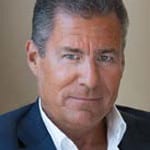 Richard Plepler
Richard Plepler
Chairman & CEO | HBO
You’ve had a life-long interest in politics that began with your father’s influence and then your time with Sen Chris Dodd. What are some of the guiding principles you’ve applied from politics to how you strategize at HBO?
I believe in win-wins. What I learned early in my career from Chris Dodd is that you can always find a middle ground to get something done. Nobody gets everything they want. I took that lesson and used it throughout my career.
With so much content being created today across platforms and with deep pocket competitors like Netflix, Amazon and Hulu, how does HBO stay competitive?
At a time when there is literally more content being produced in the history of the entertainment business, I feel that consumers will look more towards brands they trust for their entertainment. You need to know what your brand promise is and deliver it. At HBO, our promise is to curate excellence.
As an avid tennis player, what’s a life lesson you’ve learned from that sport?
Keep the ball in play. Wait for the short ball before you attack. In other words, recognize opportunity. Don’t be afraid to question the close calls.
Why do you think HBO has been able to maintain such a high programming bar for so many years?
At HBO, we have always believed that talent are sacred. Our role is to help them to realize their unique and original vision on our network. And because of the creative freedom we afford them, talent value working with us as evidenced by the many times they return with other projects. We know the magic is out there. Our job is to bring it inside HBO.
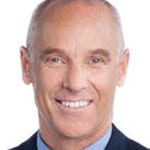 Neil Smit
Neil Smit
Vice Chairman | Comcast Corporation
Your role focusing on developing technology-oriented business opportunities sounds fascinating. Technology is moving so fast. What capabilities just blow you away?
I think we’re just beginning to scratch the surface on what’s possible with AI and machine learning when it comes to IoT and the connected home. The number of connected devices is doubling every year, customers want on-demand, instant gratification … and the best technologies will be the ones that learn, anticipate and surprise them. The ability for technology to anticipate customers’ needs and deliver the experiences they want, when they want them is extremely exciting.
How does cable stay competitive in this climate?
You have to build an innovation engine—and that’s what we’ve done. It’s all about inventing and reinventing… developing the next game changing technology or feature, and then making it even better. X1 is the perfect example. We took the best content and created a simple, personalized experience… then made it easier than ever by adding voice. We’re using the same playbook to reinvent WiFi and home control with xFi.
When people look back at your time leading Comcast Cable, what do you hope to be remembered for?
I’m lucky. I have a lot of proud moments. But I think #1 on the list would be the innovation engine we created that enables us to rollout products like X1 that redefined the category. I’m proud of how the team took that same drive to deliver the best customer experience. We knew that this would be hard and would take time, but the big changes we’ve made— like rolling out NPS—are really paying off. Customers are getting their questions handled the first time, digital tools are delivering higher satisfaction rates. We want this to be a real differentiator for us, and we’re getting there.
How does continued consolidation impact the industry?
This industry has evolved and reinvented itself countless times over the decades—and I don’t see that stopping any time soon. Competition and the pace of innovation is only increasing, but it’s also creating opportunities to collaborate and integrate in ways that will benefit customers. We’re always looking for these kinds of opportunities. Take Netflix. We took the best of X1 and the best of Netflix and integrated their content into our platform to create a seamless experience that customers love.
Moving into a part-time role has allowed you to enjoy a few trips. What’s the most amazing sight you’ve seen on your travels?
It’s hard to beat an African Safari or fishing in the Amazon with family and friends. We went ice driving in Northern Canada, which was fun—the trick is mastering the art of driving sideways on ice which is a little tricky until you get the hang of it.
What does joining the Cable Center Hall of Fame mean to you?
It’s an honor and I’m grateful and humbled to be joining such an incredible group. But my whole team deserves this recognition, not just me. Everything I know about teamwork I learned from the Navy SEALs—you don’t win … and you don’t survive without your team, and I was fortunate enough to be surrounded by a fantastic team.
June Travis Receives Bresnan Ethics in Business Award
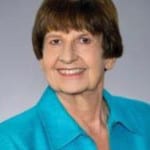 Industry veteran June Travis says ethics has long been part of cable’s DNA.
Industry veteran June Travis says ethics has long been part of cable’s DNA.
The early entrepreneurs “were very competitive with one another, but if attacked from the outside, they circled the wagons and supported one another. The collegiality was palpable,” she says.
Travis herself exemplifies this spirit and was thus named by The Cable Center as the 2018 Bresnan Ethics in Business Award. The award honors the late William Bresnan, founder and chairman of Bresnan Communications and longtime chairman of the board of The Cable Center. Awardees represent the ideals upheld by Bresnan, including “continually demonstrating ethical leadership qualities, doing what’s right in the face of adversity, even when it is unpopular, incorporating doing what’s right in everyday life, and demonstrating societal, community and philanthropic engagement.”
Travis retired from the cable industry in 1999, joining its principal trade association in 1994. Before that, she was president/COO of Denver-based cable operator Rifkin & Associates. She also held several positions at American Television and Communications Corporation, the predecessor to Time Warner Cable.
Those early examples of leadership guided Travis’ management style. Despite her heavy workload, she always found ways to give back to the industry—serving on the boards of Cable in the Classroom, C-SPAN, WICT and many others. Travis also chaired the industry’s political action committee CablePAC for 9 years.
The desire to be part of the community has continued in her retirement. She’s active in several organizations, including the Greater Denver Chamber of Commerce Board of Directors, the Colorado Forum and the Colorado Women’s Forum.
Travis believes in business leaders’ responsibility to their communities. “It’s huge,” she says. “And it pays back a hundred-fold. If you are genuinely in the community, not for the recognition, but truly caring, and participating, and supporting the community, you can’t buy that kind of customer respect.”